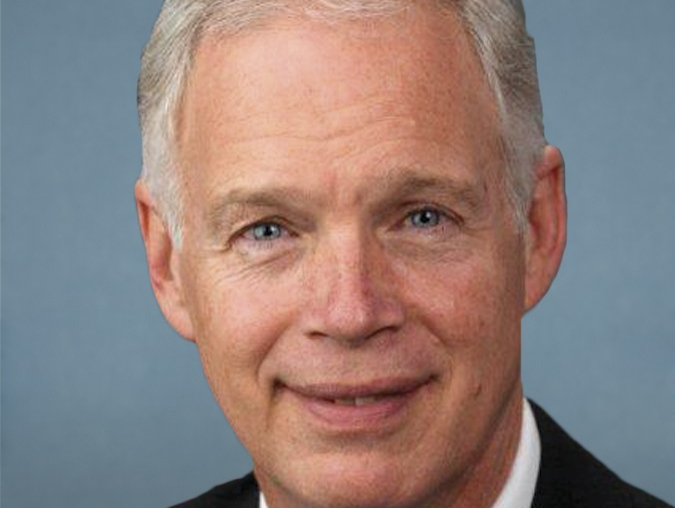Executive
Sen. Johnson Offers Initial Praise for Interim Secret Service Chief
Interview with Senator Ron Johnson (R-Wisconsin) about the attempted assassination of Donald Trump and the Secret Service’ temporary head.

The Secret Service’s myriad failures that led to an assassination attempt against former President Trump and the murder of Corey Comperatore, come as little surprise to Sen. Ron Johnson, a longtime critic of the agency. In 2014, after two years of investigating the Secret Service’s numerous disciplinary problems and security lapses, he concluded that the agency tasked with protecting U.S. presidents, vice presidents, their families, and other officials had a “systemic” or “cultural problem.”
The Secret Service gets a temporary chief
In the ensuing decade, those problems were never addressed, Johnson says, which led to the agency’s worst day since the assassination attempt on President Ronald Reagan in 1981. Reagan took a bullet in his lungs, and nearly died. White House Press Secretary James Brady was shot in the head and grievously wounded. Secret Service Director H. Stuart Knight, who also led the agency during two attempts on President Gerald Ford’s life, was eased out eight months later, although he was allowed to take a lesser post in the Justice Department. Earlier this week, Secret Service Director Kimberly Cheatle stepped down amid a bipartisan congressional firestorm over her lack of transparency and refusal to promise accountability while testifying before the House Oversight and Accountability Committee.
Department of Homeland Security Secretary Alejandro Mayorkas quickly tapped Cheatle’s deputy, Ronald Rowe, as acting director. Rowe has faced immediate scrutiny for his close working relationship with Cheatle and recent quotes to The Wall Street Journal defending her leadership as the criticism piled up in the wake of the security lapses at the July 13 Trump rally in Butler, Pennsylvania.
Johnson offers initial praise for the interim chief
But Sen. Johnson came forward Thursday to offer initial praise for Rowe, who immediately visited the Butler site Wednesday upon his appointment, a trip Cheatle didn’t make in the immediate wake of the attempt on Trump’s life. Eight days after the security breakdown in Butler, Johnson, the ranking Republican on the Permanent Select Committee on Investigations, issued the most detailed report about the numerous problems the Secret Service and local law enforcement officers from the area experienced that day. These included siloed communications, a failure to post agents or officers to the building where shooter Thomas Crooks fired at Trump and the crowd, and the Secret Service’s decision not to whisk Trump off the stage to safety once a threat was detected.
Johnson spoke to RealClearPolitics Thursday after Rowe provided a briefing to senators on the Judiciary and Homeland Security Committees. The Wisconsin Republican said his first impression was positive, that he was “impressed and encouraged” by Rowe’s commitment to informing lawmakers and the public about the security breakdown that day and his willingness to make the necessary changes to ensure it doesn’t happen again.
Interview with the Senator
RCP: How did the briefing go this morning, did you learn anything new?
Johnson: I think we were all generally impressed and encouraged by acting Director Rowe. He was very forthright, definitely concerned about the morale of the men and women in the service, which I think we all need to be. They’ve got a big task ahead of them, but both he and the FBI [official] were really, again, forthright is the best word I can say.
As I said, this was a confidence-building briefing, I made the point in the Wednesday briefing with [FBI Director] Wray … that we need to make sure that we don’t allow conspiracy theories to spread.
And I made the point [that] the way to do that is to be open and transparent, hold multiple briefings, certainly start out by saying, this is incomplete, it’s preliminary. The public cuts you slack, but we need to know things as you know [them], and I think [he] definitely acknowledged that that’s a good path to take.
I think, if his higher ups will allow, I think that’s exactly the direction he’d like to take.
One of the [conspiracy theories] is that a Secret Service sniper had Crooks in his sight, asked permission to take him out and that was denied. According to him, that’s false.
Q: So why did it take so long when the local law enforcement were tracking Crooks for more than an hour, and even took photos of him? Why the delay in the Secret Service counter sniper shooting him only after he fired shots on Trump and the crowd?
Johnson: According to him, that’s false. … They had him in sight once he stuck his head up to take the second round of shots. … They should have told us a long time ago, but from my standpoint, that’s the most important thing I learned from the briefing – it was in response to my question.
So, there is on [these metal roofs,] at the peak, there’s a piece of metal up there. He didn’t describe exactly, you know, how high. But when they had somebody [up there crawling then] crouched down, you could only just see the very crown of their head, so you couldn’t see the rest of the body.
So, I mean, if you’re a sniper, you’re scanning things, you might see a dark spot, but not even recognize his head, I suppose. … So, he was not all that visible, but apparently, he came up above that metal partition, fired off two shots, sunk down below it, then came back up in the exact same location to fire the second round of shots when they took their shot. So, he wasn’t in their sights for, you know, minutes, or, you know, even seconds. I mean, [as] soon as they got him in the sights, they basically took the shot.
Q: Why did the Secret Service agents assigned to Trump’s immediate detail near the stage let him go out on stage when local law enforcement was tracking Crooks for such a long time – did the Secret Service not know that he was armed and a threat, where did this communication breakdown occur? Why didn’t they whisk Trump off stage when the immediate threat from Crooks became obvious to rallygoers on the ground who were pointing at him?
Johnson: The acting director, basically, and I don’t want to put words in his mouth, [said] that basically he can’t defend what happened. I think they’ll investigate, and [it’s] entirely possible that people will be subjected to disciplinary measures.
There’s a pretty broad range of what that may be … You could tell he was emotionally concerned about it because he had just been to [Butler.] I could not defend it.
He was highly concerned about the ongoing morale of the Secret Service after this. He’s got, they’ve got enormous challenges ahead, and he needs the agents to have high morale, because they’ve got a lot of long hours ahead of them.
Again, I view that as a very good leadership quality. He’s coming in as acting director. He recognizes that immediately as a concern of his agency. He needs to boost the morale of Secret Service agents. I would like to see that happen as well.
Q: What about reports that local law enforcement officers left the roof where shooter Crooks fired because it was hot?
Johnson: I don’t want to denigrate anybody at this point in time, okay? But there’s no doubt about it. I’m sure it’s more comfortable in a second-story, air-conditioned building than on the roof and not having been given direct orders or direction, “No, you have to cover the roof.”
Obviously, that was a massive failure, [along with] not talking to this guy as soon as he was noticed was a massive failure. I mean, there’s, there’s just massive failures all along. It’s indefensible what happened.
Q: Did the Secret Service’s security plan assign them to the rooftop or just inside – they are saying they were never assigned to the roof? Did they leave their inside posts to go find Crooks when rally-goers started shouting?
Johnson: So this was, this is a pretty short briefing. We had an hour. And even there, you know, you’re still just scratching the surface. So, there’s a lot to be gleaned yet. The FBI has … like 700 agents on this [investigation.] They have obviously far greater capacity and capability in doing the investigation. I told them, I’m happy to back off and give you guys the ability to use your full investigation for completely transparent, [with] you keeping us totally up to speed.
[Johnson acknowledged that a lot of details are still unclear about who was responsible for not putting the building where Crooks fired the shots in the official perimeter and not assigning local law enforcement or Secret Service counter snipers to that building’s rooftop.]
Johnson: There are too many people involved here, too many people that want to justify their actions, but it’ll take a little more time. What I think is also important is the acting director immediately started taking all the actions he has to take. Again, he’s protecting people today, and so I think it’s actually pretty comforting that his primary focus, truthfully, until we started asking questions, was to let us know the actions he’s taken immediately as acting director. I think that’s entirely appropriate.
It was a confidence-building briefing, and that’s good. And you know those answers to those specific questions, those will come. Cheatle has already been held accountable. There’s a lot of puzzle pieces to be filled in here. I just can’t fill them in right now.
This is a failure at the top. With this acting director, I’ve had far greater confidence that we’ll find out exactly what happened, and people will be held accountable. I would not have said that with Cheatle.
This article was originally published by RealClearPolitics and made available via RealClearWire.
Susan Crabtree is a political correspondent for RealClearPolitics. She previously served as a senior writer for theWashingtonFree Beacon, and spent five years asa White House Correspondent for theWashington Examiner.
-

 Accountability3 days ago
Accountability3 days agoWaste of the Day: Principal Bought Lobster with School Funds
-

 Constitution2 days ago
Constitution2 days agoTrump, Canada, and the Constitutional Problem Beneath the Bridge
-

 Executive1 day ago
Executive1 day agoHow Relaxed COVID-Era Rules Fueled Minnesota’s Biggest Scam
-

 Civilization5 hours ago
Civilization5 hours agoWhy Europe Shouldn’t Be Upset at Trump’s Venezuelan Actions
-

 Civilization1 day ago
Civilization1 day agoThe End of Purple States and Competitive Districts
-

 Christianity Today4 hours ago
Christianity Today4 hours agoSurprising Revival: Gen Z Men & Highly Educated Lead Return to Religion
-

 Civilization5 days ago
Civilization5 days agoThe devil is in the details
-

 Executive4 days ago
Executive4 days agoTwo New Books Bash Covid Failures








